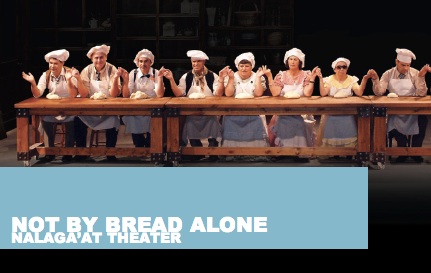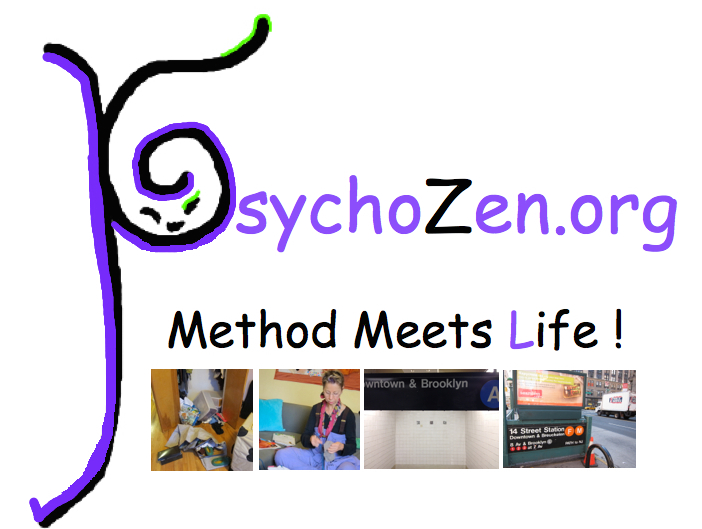Breaking Bread with the Crips
A packed house, a teen nightmare, a sweet story of communion, and a deeply offensive work of not-art.
 Not by Bread Alone features a troupe of deaf blind 'actors' ladling out friendly vaudevillian vignettes that feature pantomime, supertitles, and kinesthetic sign language. Also, they are baking bread. We learn that the deaf and blind "have dreams, too," dreams of love and marriage, and dreams of having hair done by a super duper stylist. Just like us.
Not by Bread Alone features a troupe of deaf blind 'actors' ladling out friendly vaudevillian vignettes that feature pantomime, supertitles, and kinesthetic sign language. Also, they are baking bread. We learn that the deaf and blind "have dreams, too," dreams of love and marriage, and dreams of having hair done by a super duper stylist. Just like us.
I showed up with a bunch of Zen friends, but on my way to the bathroom I encountered pals from the Disability Activist community--dancers with wheelchairs and sticks, brilliant academics and deconstructionists, already prepared to be pissed about the patronizing and pandering. I stayed with them awhile in the wheelchair area (we had to go the back way, out of sight), and then I climbed the stairs, because I can, to meet up with my Zen friends, the able-bodied group.
The show began. The actors, costumed in some kind of unplaceable homespun historic garb, changing hats every now and then, mugged and laughed and danced. The music, too, bathed us in rollicking good cheer. In the background, interpreters wearing black gave cues with their hands, subversively smearing the boundaries between help and direction. Who was in charge?
After the show, the audience was invited to break bread on stage. I sat glumly with my Zennies, waiting for the Q&A. We spoke of the absence of intelligent style, of dignity, of relationship, of complexity. Catching sight of several anti-psychiatry activists, I went over to commiserate. I tried to say something about what my friends thought, but I tripped over my sentence and went blank. The words "able bodied normals" came out of my mouth and I instantly felt disloyal to both groups. They looked at me with great interest as I froze, the roar of the room wiping out words, separatist thoughts from opposing universes jamming up my brain like an isometric. Did you have this nightmare as a teen? I did. When you change yourself in different ways to fit into different groups but then they all show up at the prom. All I could do was admit my paralyzed brain and slink away.
In the Q&A , the director, understandably, did most the talking. She described how, when an actor complained about the childish pantomime and balloons, she said: "trust me." I had hoped to hear her say that she listened to the actor, but no, she was proud that she stuck to her vision. She wanted to convey innocent dreams, playful camaraderie, buffoonery. I flashed on Black tap dancers with big smiles, and remembered my first Zen teacher, a Black woman, telling me how much unseen effort goes into making White people comfortable.
Disability activist Simi Linton expressed her desire to see the actors be more autonomous. Another panelist suggested that the reality of being deaf and blind was more complex than the picture we saw. But the director hued to her simple vision, presenting her troupe as heroes to be supported. Leslie Freeman asked one of the deaf blind actors about his experience, and he spoke of how happy it made him to share his dreams, to show the audience that he is Just Like Us.
The thing is, it is true, and it is important. Maybe it is the most important thing of all. It is easy to applaud and mean-hearted to withhold praise when you see people showing their humanity. It is poignant that we want to know each other, and we want to be on the right side. At one point someone noted that the disabled are not animals. That gives you an idea about the starting point. Well, actually, of course we are all animals, but we are animals in hierarchies, jostling for position. To see a wounded member of the herd as an equal is a notable act of evolution.
So, this is where we begin. There has to be a bridge. You can stay in your separate universe and make great art and intelligent conversation, but the world will not be changed, and I shout that we must change the world, at least a little. We start with the simple generalities, like Obama did, and then we push a little, until it hurts, then we back off, then push again. Like yoga. Like intimacy. That's how we change.

 Share Article →
Share Article →
Reader Comments (2)
Well said, and thought provoking.
From self-loathing at the prom to the balm of how to find our way out (push till it hurts) you cover a lot of territory, and succinctly. One of the things that makes it so layered is your awareness and/or participation in so many sub-groups: normal, crip, privileged white woman, zen practitioner, psychologist. Do you know this one: if you're comfortable in your coalition, it's not broad enough. No wonder you're uncomfortable!